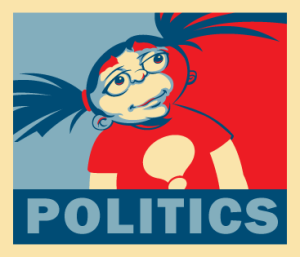
Let’s be honest- most grown-ups don’t have a good grasp on political issues. Voter turn out is typically disappointing, and we have a tendency to give knee-jerk reactions, instead of thoughtful, well-informed arguments. We often don’t feel like we’re represented, or that we have any business being involved in politics.
Getting big people to see themselves as political is tricky, but that doesn’t mean we shouldn’t get our kids involved as early as possible. Okay, maybe dragging them to demonstrations, and exposing them to troubling stories on the news isn’t the way to go. However, it doesn’t hurt to introduce them to some of the big ideas involved in politics, such as power, justice, fairness and leadership. Kids are naturally interested in these sorts of ideas, and have to deal with them in their daily lives. Many parents who do decide to talk politics with their children find that the young minds in the house have been mulling over political questions for a long time.
So, here’s a list of questions that will spark discussion among politically-minded youngsters, and get them ready to think about bigger issues as they grow:
- What does it mean to be powerful? Is there such a thing as good power or bad power? How do we decide who gets to have power?
- What makes someone a good leader? Can anyone be a good leader?
- How do we choose who gets to be in charge? Can we change our minds later?
- How do you make sure that things are fair? Does one person get to decide, or do many people get to decide what’s fair? Can you change your mind about fairness if your situation changes?
- Is it okay for some people to have more than others? In what situations might that be okay?
- Are all people equal? Can we all be different, and still be equal in some way?
- If you could start your own country, what would it be like? What would be important to include?
- What are some things that everyone should be allowed to do? What are some things that everyone should be expected to do?
Some of these questions probably sound familiar, even if your little thinker is very young. Questions like these come up in sports and games, in classroom activities, in family dynamics, and even in the way a child sees themselves. They’re questions that have been asked throughout the course of human history, and in including your little thinker in discussion of them, you not only engage them in a very human practice, but you also help prepare them to actively participate in society as adults.
For a place to start, check out our “Who’s The Boss?” in our ThinkAboutIt series, as a print book, or an interactive eBook. For more ways to play with political quetions, check out our politics-themed lesson plans on our Teach page.
